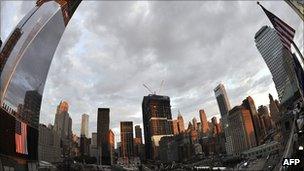9/11 anniversary: Time for nation-building at home
- Published
- comments

9/11 altered perspectives for many Americans
It is the first time I have seen the Memorial Fountains at Ground Zero working. They are pretty impressive. The footprints of where the towers once stood have been turned into square pools, dark and huge, a waterfall on each side. All around the edges are engraved the names of those who died in the buildings.
But looking out of the window as I write, part of the area is still a building site, a huge square of churned-up mud. Five giant diggers squat, for the moment idle, the area scattered with concrete cylinders and metal parts.
It has taken a long time to turn a scar into a memorial, and the job is not yet done. America too has not fully absorbed and digested the events of that day, but it is beginning to do so.
President Obama's weekly radio address suggests some of the ways he thinks America should move on. But some of the changes will probably never go away.
When I arrived in New York, I left the train at Penn Station under the watchful eye of a man holding a heavy machine gun. On the concourse, a video was playing on a huge TV screen about a "three foot hero" keeping us all safe - the tale of a sniffer dog. As I made my way downtown, the police were stopping every large van and lorry. This is exceptional, but every time you go into an airport you know life has changed.
During the summer, when I first started asking Americans about how 9/11 had changed their country, I was surprised. I had been expecting something about the wars, or other philosophical reflections. Instead they talked about queues at airports. It has become a new way of a life in the last 10 years.
Security has got tighter in the UK too but, because of the IRA campaign, it had always been there in the background. For us in Britain the change was incremental, for Americans it was the start of something new. The USA's enemies have imposed an irksome but necessary burden on all Americans.
So a sense of vulnerability and the priority of protection will remain.
Decade of war
But, although President Obama will stand alongside former president George W Bush on Sunday, I expect he will make clear in his evening speech in Washington that the priorities are rather different to the initial response.
Rather like his speech to congress, his weekly radio address appealed for a common spirit and unity but was quite political.
He pointed out that it was only while he was president that the war against al-Qaeda had scored major triumphs.
"Over the past two and a half years, more senior al-Qaeda leaders have been eliminated than at any time since 9/11. And thanks to the remarkable courage and precision of our forces, we finally delivered justice to Osama bin Laden."
He suggested that at least some of the military action that flowed for 9/11 was falling into al-Qaeda's trap.
"They wanted to draw us into endless wars, sapping our strength and confidence as a nation. But even as we put relentless pressure on al-Qaeda, we're ending the war in Iraq and beginning to bring our troops home from Afghanistan."
Then another critical point.
After a hard decade of war, it is time for nation-building here at home.
On Friday night, on the Ten O'Clock news, I had used the same phrase - saying that is what some Americans were reflecting. I had no idea of course the president was about to use it.
It is a new formulation, but I had most recently heard it from Republican candidate John Huntsman in their recent debate.
It suggests that, on left and right, the biggest change is that an enthusiasm to re-shape the world has faded, even if there is still a determination to make it safer for America and its allies.